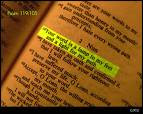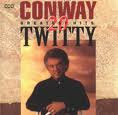What Does
the
Bible Say
Say About...
The Ultimate
Resource
for Biblical Truth!
The first question submitted to "What Does the Bible Say?" is:
Why do Christians accept certain moral laws from what they call the Old Testament, but not others laws? What separates the ones you decide are incumbent upon people from which ones that aren't?
The example given was,"why do Christians declare homosexual activity to be immoral, but they have no problem with eating certain foods or wearing clothes made of line and wool mixed together." What makes the difference? All of these are forbidden in relatively close proximity in the Torah, but only one of these is considered to be wrong. There are a number of questions here but here goes!
The apostle Paul wrote, "Study to show thyself approved unto God, a workman that needeth not to be ashamed, rightly dividing the word of truth" (2 Timothy 2:15).
The idea of "rightly dividing" is handling accurately. In "handling accurately the word of truth," we must recognize and understand the two basic divisions of the Bible—the Old and New Testaments.
The old covenant revealed the coming of a new and better way which is the New Testament. Jeremiah, the Old Testament prophet, wrote in Jeremiah 31:31, "
Behold, the days come, saith the Lord, that I will make a new covenant with the house of Israel, and with the house of Judah."
This passage has its fulfillment in Hebrews 8:8-13. Here, the writer of the book of Hebrews points out the many "
faults" of the old covenant and contrasts them to a new and living way with better hopes and promises—the perfect New Testament.
The old covenant revealed the coming Messiah. The many prophecies of that covenant pointed toward the many facets of the Messiah. It prophesied His birth (Isaiah 7:14). It revealed the Messiah's forerunner as
"The voice of him that crieth in the wilderness, Prepare ye the way of the Lord, make straight in the desert a highway for our God (Isaiah 40:3). It predicted the Messiah's zeal (Psalm 69:9), His miracles (Isaiah 35:5-6), and characterized His preaching (Isaiah 61:1-3). Also, it described the Messiah's betrayal by a friend and His death (Zechariah 11:12; Psalm 22). Further, the Old Testament prophesied the Messiah's resurrection and ascension (Psalm 2:7; 68:18; 110:1).
The old covenant revealed sin. Paul wrote,
"Therefore by the deeds of the law there shall no flesh be justified in his sight: for by the law is the knowledge of sin" (Romans 3:20)
The old covenant was written as a shadow of a new and better way which is the New Testament. Hebrews 10:1 says, "
For the law having a shadow of good things to come, and not the very image of the things, can never with those sacrifices which they offered year by year continually make the comers thereunto perfect."
The old covenant was written for our learning. In Romans 15:4 Paul wrote, "
For whatsoever things were written aforetime were written for our learning, that we through patience and comfort of the scriptures might have hope."
The old covenant was written for an example and for our admonition. In 1 Corinthians 10:11 Paul wrote,
"Now all these things happened unto them for ensamples: and they are written for our admonition, upon whom the ends of the world are come."
The old covenant went out of effect after the testator of the New Testament died. Hebrews 9:16 says,
"For where a testament is, there must also of necessity be the death of the testator." The testator of the New Testament is Christ Jesus. Paul wrote,
"Blotting out the handwriting of ordinances that was against us, which was contrary to us, and took it out of the way, nailing it to his cross" (
Colossians 2:14).
Thus, the Old Testament went out of effect at the death of Jesus. The New Testament of the testator was made known at the first preaching of the gospel of Christ (Acts 2:22-40) on the day of Pentecost in the city of Jerusalem in AD 33 as was prophesied.
Why Did The Old Testament Become Of No Effect?
The old covenant could not take away sins. Hebrews 10:4 & 11 says, "
For it is not possible that the blood of bulls and of goats should take away sins." (11) "And every priest standeth daily ministering and offering oftentimes the same sacrifices, which can never take away sins."
The old covenant contained faults. Hebrews 8:7 says, "
For if that first covenant had been faultless, then should no place have been sought for the second."
The old covenant was a shadow and not the real. Hebrews 8:5 says that the Old Testament priests
"serve unto the example and shadow of heavenly things." Further, the Hebrews writer said,
"the law having a shadow of good things to come, and not the very image of the things..." (Hebrews 10:1).
The letter to the Hebrews was written by a Jew, who had been formerly steeped in Judaism and had been enlightened by the Holy Spirit of God and had come to Christ where the veil over his eyes had been removed. He wrote with a broken and compassionate heart to other Jews who had turned to Christ and yet under the pain of persecution was thinking of leaving Christ and returning to Judaism. Read the letter to the Hebrews, praying that God would open your eyes, again and again, until He does. You will then see that this make sense!
Now to the specifics of the question – a careful search of the New Testament will reveal that Jesus Christ reiterated all of the laws of the 10 commandments in the New Testament except the Sabbath. The Sabbath was part of the covenant God made with His chosen people. Therefore, the Sabbath is not binding on believers in this the age of grace.
To respond to the question about homosexual behavior being considered immoral; the Old Testament is not the only place it is dealt with. Paul reminded the Corinthian believers that some of them formerly practiced homosexuality. The apocalyptic book of The Revelation of Jesus Christ states that unrepentant practicing homosexuals will not enter the kingdom of heaven. This was considered a sin in the New Testament period also.
What it comes down to is the entire system of Judaism was set aside when Christ perfectly fulfilled the law on the cross of Calvary. He was declared to be the son of God by his resurrection from the dead. Therefore all of the ceremonial, dietary, clothing, and other "laws" were superseded and fulfilled in Christ. Those laws and ceremonies were given to show to the world that the Jewish nation was unique, separate, and where the presence of God dwelt on earth.
Therefore, food requirements are not binding. Clothing issues are not binding. Those things were given to the Jewish nation and not to the church, which is a separate entity from the true, spiritual nation of Israel. Even Peter knew this, the great Apostle to the Jews. He experienced a vision where God revoked the food laws by saying, Rise up and eat from the formerly unclean animals. (Acts 10)
Paul, with a broken heart made this statement in II Corinthians 3:12-17;
“Since we have such a hope, we are very bold, not like Moses, who would put a veil over his face so that the Israelites might not gaze at the outcome of what was being brought to and end (
The Old Covenant-Judaism).
But their (
Jews)
minds were hardened (
this breaks my heart).
For to this day (
Paul’s day right through our day)
when they read the old covenant, that same veil remains unlifted, because only through Christ is it taken away. Yes, to this day whenever Moses is read a veil lies over their (
The Jews – God’s dear, chosen, people)
hearts. But when one turns to the Lord (The
Lord Jesus Christ, the Son of God) the veil is removed. (Emphasis and comments mine)
Christians are not under the law. They are under grace. Grace still forbids sin against God and His Holiness. Homosexual behavior is still immoral, just as adultery, fornication, or bestiality. It isn’t that we accept certain moral laws from the Old Testament and not others; it is that sin is still sin, whether formerly under the law or now under grace.
In response to your statement that from a Jewish perspective this doesn’t make sense, I know. You are right. It doesn’t make sense. Why? Because as you read Moses, your heart is yet hardened and the veil still covers your eyes. We are not picking one of three laws to obey and the others to reject. The law cannot save. It cannot justify. It was a school-master to drive the Jews and the Gentiles to Christ. (Galatians)
Now, let me say that first, there are many who claim to be Christians who are not Christians; Matthew 7:21. Please don’t judge true believers in Christ along with those who are mere hypocritical professors, who “honor God with their lips, but their hearts are far from Him." Just because someone says that they are a Christian does not mean that they are.
Second, there are a lot of messed up teachings circulating in the body of Christ and always has been. Satan wants to confuse, disrupt, and invalidate the gospel message of Jesus Christ. Many aberrant teachings attempt to put the believer back under the law and even under Old Testament Judaism. Even life long Jews recognized that they couldn’t keep the burden of the law and James asked the question, "W
hy would Gentiles be required to be placed under the same burden?" Read the Jerusalem council in Acts 15 carefully.
I have done my best to answer this question. My answer is lengthy. I will save your second question for the following week. This will not make sense to you and you will not accept this answer. Why? Read carefully, asking God for insight
I Corinthians 3:12-17. As much as I like interacting with you, and I hope it continues, I feel your heart is yet hardened and your eyes are covered with a veil.
I pray for you to do as Paul said, as Jeremiah promised in chapter 31, as Ezekiel predicted in chapter 26, that you will turn to Christ and then He will take out the heart of stone and replace it with a fleshly heart that understands. Do this before it is too late!
Only through Christ Jesus the Lord is the veil taken away!
.jpeg)



.jpeg)

.jpeg)

.jpeg)





















.jpeg)















